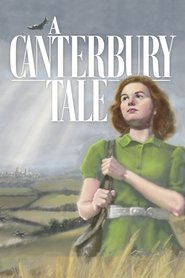With the intimation of a semi-mystical transhistorical storyline fused onto a wartime propaganda melodrama, the opening half-hour promises far more than this film eventually delivers. It all just seems to dissolve away, and more and more of the screentime is taken up by poorly-acted B-movie American servicemen in place of, for instance, Sheila Sim's jolly hockey sticks of Alison Smith. Unfortunately the only thing A Canterbury Tale lives up to is the old reviewing cliché of "the ideas don't seem to come together in the end".
[F]ormal choices were included to make the viewer of the 1940’s aware that the film was set in the present, despite its medieval allusions and allegorical framework. The film’s most successful realistic device, however, is its rendering of wartime feelings of loss and uncertainty. The familiar sense of instability underscores the motivation for the “miracles” granted to the protagonists in the film’s conclusion.
— Oliver William Pattenden (Cineaste)

